- Home
- Patricia MacLachlan
Unclaimed Treasures Page 3
Unclaimed Treasures Read online
Page 3
Her mother’s voice interrupted Willa’s fantasy. “There are some things you can’t do just for yourself, Willa. You have to consider others.”
Willa’s sudden anger surprised her. “Who?” she burst out. “What others? Us? Nicholas and me? Is it our fault?”
“Oh, Willa, you don’t understand,” said her mother in her infuriating soft voice. She held out her hand. “You’re a bit young, yet.” Willa’s mother got up heavily, stretching backward, her hands on the small of her back. “We’re having dinner guests tonight. It would be nice if you’d help.” Yawning, then stopping for a sudden bright smile to Willa, her mother left the room.
Willa was speechless with anger. It filled her body. It was as if her mother had opened a door and then shut it before Willa could look inside. Willa’s hands shook as she got up. How can you love someone so much one moment, she thought, then hate them even more the next? Willa stood for a moment. Furious, she turned on the vacuum cleaner with such a vengeance that she spilled a box of paper clips on the floor. For a second Willa hesitated. Then, grimly, she bent down and sucked them up—every one—into the vacuum cleaner, clinking and clanking loudly. Wind chimes blown wild.
By the time Willa began the salad for dinner she had still not lost her anger. She was full of silence as she chopped the celery and sliced radishes. Nicholas, peering sideways at her, knew enough to keep still as he set the table. Finally, Willa could stand it no longer.
“Who’s coming for dinner?” she grumped, eyeing the two additional places. “Students?”
Her mother turned at the sink, holding out a bunch of daisies and phlox. “These are for the table, please, Nicholas.” She turned to Willa. “Tonight is Horace and Matthew,” she announced. “I thought I’d told you.”
A moment passed. Matthew. Matthew must be her Matthew. She had only known him, until now, as Papa or Horace’s father. Or her true love.
“Here?” she asked, breathless. The bouquet of flowers blurred, just as everything had the day she met Horace and his father.
Wisely, Nicholas said nothing.
“Yes, here,” said her mother, turning the flowers, standing back to study them. “There,” she said, smiling. “Just right.”
Just right. Just right, echoed in Willa’s mind. Slowly, Willa put up her hands to smooth her hair. And then it was too late. The kitchen door opened, and there stood Horace, plump and eager; his father behind him . . . holding flowers. Matthew smiled as he gave the flowers to Willa’s mother.
“For you,” he said. “From the Unclaimed Treasures and us. And our thanks for the invitation.”
“Aunt Crystal and Aunt Lulu are asleep,” said Horace, “after a hard day of blanket birding.”
“Well, dinner isn’t anything special,” said Willa’s mother. “Only chicken pot pie.”
Chicken pot pie! Willa was aghast. She loathed chicken pot pie. Chicken did not belong in a pie. Berries or chocolate did. She looked at Horace, expecting him to look aghast, too. But Horace and his father smiled.
Ted held Wanda’s hand all through the soup course, through the salad, through the stuffed artichokes, and into the steak with baked potatoes.
“Steak and moonlight,” murmured Ted lovingly.
“And you,” Wanda murmured back to Ted. “What more could one ask for? What more could one ask for?”
“Chicken pot pie,” exclaimed Willa’s father, “is my very favorite.”
Willa looked at her father, horrified.
“One of mine, too, now that you mention it,” said Matthew. He lifted his wineglass and looked at Willa. “What about you, Willa?”
Willa took a breath and looked at Nicholas, who was smiling into his salad plate.
“I truly love chicken pot pie,” she said happily. She turned to look at Matthew, lifting her chin. “What more could one ask for?” she said. “What more could one ask for?”
5
Dinner was a blur of images and sounds; glasses raised in the candlelight, silverware clinking against plates, quiet conversation. Willa watched Matthew through the flowers, his face framed by leaves and blooms.
“Winnie’s gone for a while,” he said.
Willa looked up. Who was Winnie?
“Meanwhile, thank goodness for the Treasures, though their experiments with cooking tend to go overboard. Last week it was an overabundance of garlic. This week, what?” He looked at Horace.
“Curry,” said Horace, wrinkling his nose.
“Thank goodness for neighbors,” said Matthew, raising his glass in a toast to Willa’s mother and father.
“Thank goodness for apples,” said Horace softly, making them all laugh.
“You’re a painter, aren’t you, Matthew?” Willa’s father leaned over to fill Matthew’s glass.
“I am.”
“Pictures?” asked Willa, her voice sounding strange to her. She suddenly remembered the smudge of blue on his wrist. His hand on Horace’s head.
“Not houses,” said Nicholas, next to her.
“I didn’t know that!” Willa was indignant. “No one told me.”
Matthew put on his glasses and looked over Willa’s head. “No one told me that there is an artist in this house,” he said. Abruptly he pushed back his chair and got up. In two long strides he was examining a drawing on the wall. It was a drawing of a figure lying in a field of wild flowers.
“Asters,” said Matthew, smiling. “Nice.” He looked more closely. “N. Pinkerton.” He turned to Nicholas. “Is this yours, Nicholas? Are you N. Pinkerton?”
Willa, embarrassed for Nicholas, expected him to be modest, shy. But Nicholas was grinning broadly.
“Yes. And I’ve got more if you’d like to see.” Before anyone could utter a sound Nicholas was out the door, bounding up the stairs.
Matthew moved to another wall.
“And this one? Is this his, too?”
“That’s his, too,” said Horace with his mouth full of chicken pot pie. “It’s a drawing of the garden before anything grows in the garden.”
Matthew folded his arms.
“Extraordinary,” he said.
Willa smiled. Of all Nicky’s drawings, this was her favorite. She loved the long furrows where seeds were planted, the border of wire fencing.
“Like the beginnings of a quilt,” Willa had said to Nicholas when he first showed it to her. Nicholas had beamed at her.
“Where’s the rest of it?” her mother had asked, and Willa had been furious with her. But Nicholas, calm, had explained that was all there was. Just the way it was. There on the paper.
Willa had exploded. “Why don’t you tell her the garden is there, just under the surface, about to come up?”
Nicholas had shaken his head. And his patience with his mother had made Willa even more angry. “She doesn’t see it the way I do, Willa,” he had explained. “The way we do.” He had held out the drawing, peering at it. “Mama doesn’t see the hidden things, those things under the surface, like seeds or roots or night crawlers.” He had looked at Willa then. “Why,” he had asked softly, “does that make you so angry?” Willa, her teeth clenched, had felt the sudden tightening in her throat that meant tears. She had stared at Nicholas, unable to ask the question that she wanted to. Why is it, Nicholas, that it doesn’t make you angry?
“Here,” said Nicholas, bursting into the dining room, intruding into Willa’s thoughts. He pulled his chair next to Horace’s father’s and handed him a folder of drawings.
Matthew laughed. “Whatever is this, Nicholas?” He held up a drawing, and Willa saw with a sudden sinking feeling that it was his drawing of her entwined with her bedpost.
“Uh . . . that,” began Nicholas, looking at Willa, “is two friends,” he finished in a rush.
Matthew looked from the drawing to Willa and back again. He smiled slightly. “Some friends,” he said.
Willa’s mother got up and peered over Matthew’s shoulder. “Why,” she began, “that looks a bit like Willa! Willa and her bedpost!”
<
br /> Willa’s face grew hot and she closed her eyes, her hands clenched together in her lap.
“Mrs. Pinkerton.” Horace’s voice was loud in the dining room. “Could I please have some more of this chicken pot pie?”
Willa opened her eyes. She could feel tears at the corners.
“Why, of course!” Willa’s mother was delighted. “Here, Horace. I wish everyone in this house liked my chicken pot pie as much as you do.”
The bedpost drawing forgotten, Willa’s mother served Horace a helping of chicken pot pie.
Horace looked over his plate at Willa. His eyes were steady and unblinking. And then, one corner of his mouth twitched.
For me, thought Willa with sudden recognition. Horace did that just for me.
“And this is fine, Nicholas,” Horace’s father went on, delighted. “The color. The reds!” He held it up for Willa to see.
The painting was of Willa, lying on the Oriental rug in her father’s study, reading a manuscript. Beside her lay the vacuum cleaner, tangled and quiet like a sleeping snake.
Willa’s father smiled and looked over his glasses. “Willa truly loves vacuuming.”
“And this.” Matthew turned to another drawing. “The apple tree in the side yard.”
“The untrustworthy apple tree in the side yard,” said Nicholas.
“I know,” said Matthew. “I heard what Lulu told you. But she’s right, you know. The limbs are old and brittle.” He frowned. “Soon the fruit will be on the tree again.” He looked up. “Which reminds me that I have a painting to finish. And no model.”
“You have a show in the fall, don’t you?” Willa’s father leaned back in his chair. “I read about it somewhere.”
“Papa,” said Horace suddenly. “What about Willa?” Everyone turned to look at Horace, who was chewing on a stick of celery.
“What about Willa?” asked Nicholas.
“What about me?” asked Willa.
Horace’s father leaned forward, studying Willa. “Horace,” he said slowly, “I do believe you’re right. Willa, would you like to sit for me?”
“I am sitting,” said Willa.
“I mean for a painting. I need a model. Of course, I would pay you.”
Pay me? For sitting?
“That is, if you’ve nothing more important to do for the next few weeks. And if your parents don’t mind.”
“Would you like to, Willa?” her father asked. “It isn’t easy, you know.”
Not easy? Of course it would be easy. Sitting for him.
“I had started the painting with Winnie—Horace’s mother,” said Matthew. “But I need a model to finish it.”
Winnie. Horace’s mother. Gone to seek her fortune.
“It would mean about three morning hours a day. When the light is best.”
“Ted, Ted, sweet Ted,” murmured Wanda. “Come and regard the sunrise.”
“Wonderful Wanda,” exclaimed Ted in wonderful wonderment. “Let me see you when the light is best.”
“Willa.” Nicholas poked Willa’s arm. “Willa.” Startled, Willa looked up to see them all watching her.
“Yes,” said Willa. “I guess I can sit for you.”
“Well then.” Matthew smiled. “We’ll begin in a day or two.” He turned to look out at the apple tree. “Then I can face the figure in the painting.”
“The figure?” asked Nicholas.
“Some painters have trouble with color,” said Matthew, his eyes fixed on the tree. “Some with form. Some with content.”
“It sounds like my students,” said Willa’s father wryly, “who have trouble with all of the above.”
“My trouble is the figure in the painting,” said Matthew. “I cannot seem to get that figure.” His voice trailed off. “And the face,” he repeated to himself, as if no one else was there.
“When I am an artist,” began Nicholas. He stopped because Matthew had turned and was holding up his hand.
“Nicholas.” Matthew put his hand on Nicholas’s shoulder. “You are an artist. Right now.”
“Right now?” Nicholas grinned.
“Right now. And now we must go,” said Matthew.
There was talk then, the scraping back of chairs, and they moved from the dining room through the kitchen. Willa walked behind Horace, looking at his father’s hand on Horace’s shoulder.
Outside the moon was rising, touching the leaves of the apple tree. Matthew and Willa’s parents walked across the grass talking quietly of gardens and lawns and the evening. Willa saw her father put his arm across her mother’s shoulders.
“Hey, Willa,” whispered Nicholas. “Guess what.”
“What?”
“I’m an artist, Willa. Right now.”
Willa and Horace smiled, their teeth gleaming in the darkness.
“Hey, Nicholas,” whispered Willa. “Guess what.”
“What?”
“I’m a sitter,” whispered Willa.
Nicholas sat on the lowest limb of the apple tree, swinging back to look up. Horace and Willa sat on the ground. Horace loosened his belt and lay flat on the grass.
“Hey, Willa, hey, Nicholas,” he whispered. “Guess what.”
“What?” asked Willa.
“I hate chicken pot pie,” whispered Horace Morris. And the three of them snickered and snorted, finally breaking out in shrieks of laughter under the moonlit apple tree.
The woman shifted a bit in the chair by the window. Her back hurt strangely, in a way different from any she had ever known.
She watched the man walk past the fireplace, past the bay window, past the grand piano that sat like a watching dog. He hung the picture of the woman and the apple tree over the fireplace. The woman smiled because she was watching the man’s face and he was smiling.
The woman in the painting was young, and wore a white dress trimmed with ivory lace. In her hand was a wide-brimmed white hat with pale-green streamers falling from it like trailing fingers. It was spring, and the tree was laced with white flowers.
“I can almost smell the blooms,” said the man.
“That was the summer,” said the woman, “that I thought the figure in the painting was me.”
“It was; it wasn’t,” said the man. “It was just like Old Pepper said, ‘Things are seldom as they seem. You must do better than just look.’”
“Old Pepper,” said the woman, remembering. “It was Old Pepper who told us it was the everyday things that matter. Like morning light, the smell of grass, who you are, what you think, and how you live.”
“Simple, everyday things,” said the man, and they both laughed.
“Who knew then,” said the man, thoughtfully, “that Old Pepper was right?”
6
The Middle
“Elephant. It’s easy,” urged Willa. She sat on the curbstone with one of Porky Atwater’s younger brothers. This one was Jojo, though his real name was Ronald. There were seven brothers and sisters in Porky’s family, and none of their nicknames had a thing to do with their given names. Porky’s real name was Eldred, Lala was really Dwight, Goosie was Martha-Corinne, Possum was Chris, and on and on.
Jojo was four years old and couldn’t say elephant. It didn’t bother Jojo a bit. But it sent Porky into a “decline,” as Aunt Crystal called it. Aunt Crystal was an expert in the area of “declines.” She told Willa and Nicholas about the mailman who had gone into a “decline” because Aunt Lulu didn’t want to marry him. “She loved him for the mail,” Aunt Crystal confided to them, “and the mail only. He went into quite a decline after that,” she went on. “Legs gave out. Had to be driven on his route.”
“Come on, Jojo. Elephant.”
Jojo took his finger out of his mouth.
“Elephantent,” he announced.
Porky clapped his hand to his forehead and fell over backward on the grass. The beginnings of a decline, Willa thought.
“Too many syllables,” said Willa patiently.
“Syllalables?” asked Jojo.
&n
bsp; “Syllables,” said Willa slowly.
“Don’t know ’em,” said Jojo. “I want a Popsicle.”
“No Popsicles until you say elephant right,” said Porky. “Everyone else in the family can say elephant.”
“Mean,” mumbled Jojo, shoving his entire hand into his mouth.
“It’s easy, Jojo,” said Willa. She reached over and took Jojo’s wet hand out of his mouth. “Say el.”
“El,” said Jojo.
“Ah.”
“Ah.”
“Phant.”
“Phant,” said Jojo, smiling.
“Elephant,” whispered Willa.
“Elephantent!” shouted Jojo. “Can I have a Popsicle?”
“No!” shouted Porky.
Jojo screwed up his eyes and began to cry, jamming both hands into his mouth.
Willa put her arms around him. “Go get him a Popsicle, Porky. And a handkerchief for his nose goo!” she called after him.
“What’s up what’s the matter why is he crying?” asked Old Pepper, leaning on his cane. Bella walked behind him, hooked to a chain leash clamped around Old Pepper’s wrist.
“He’s upset because he can’t say elephant he wants a Popsicle,” said Willa, realizing she’d just said a run-on sentence.
Old Pepper bent down slowly, slowly, and collapsed in a heap on the curbstone.
“Hush up,” he commanded, and to Willa’s great surprise Jojo hushed. He took his hands out of his mouth, hiccuping softly.
“Say elephant, Jojo,” said Old Pepper.
“Elephant Jojo,” said Jojo, sticking his hands back into his mouth again.
“Elephant Jojo,” repeated Bella as she hopped down from the curbstone to examine the street.
“He can say it!” exclaimed Willa, amazed.
“Sure he can say it sometimes he doesn’t want to,” said Old Pepper.
“Just doesn’t want to?” asked Willa.
“To,” said Bella, tilting her head, her beady eyes on Willa.

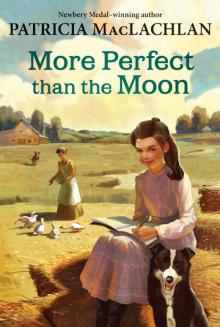 More Perfect Than the Moon
More Perfect Than the Moon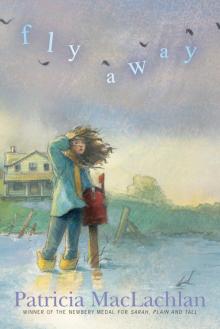 Fly Away
Fly Away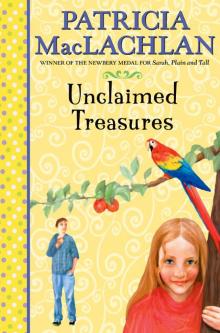 Unclaimed Treasures
Unclaimed Treasures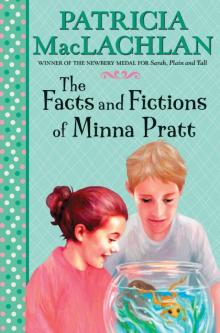 The Facts and Fictions of Minna Pratt
The Facts and Fictions of Minna Pratt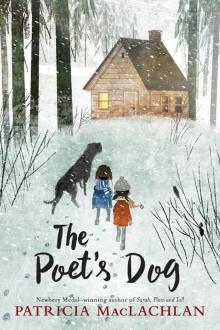 The Poet's Dog
The Poet's Dog Journey
Journey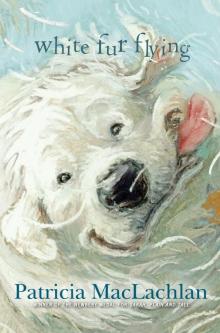 White Fur Flying
White Fur Flying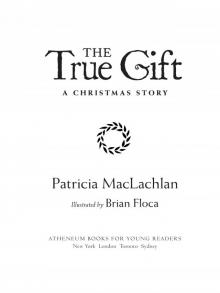 The True Gift: A Christmas Story
The True Gift: A Christmas Story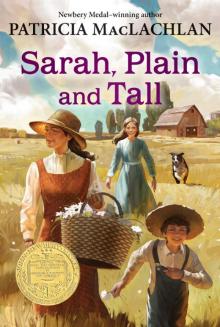 Sarah, Plain and Tall
Sarah, Plain and Tall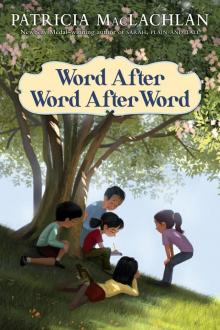 Word After Word After Word
Word After Word After Word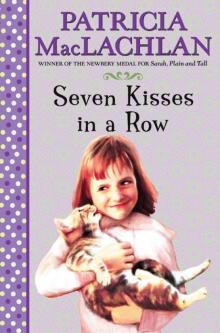 Seven Kisses in a Row
Seven Kisses in a Row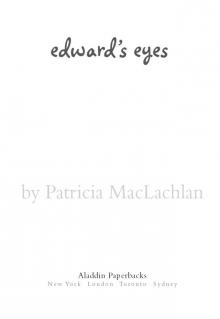 Edward's Eyes
Edward's Eyes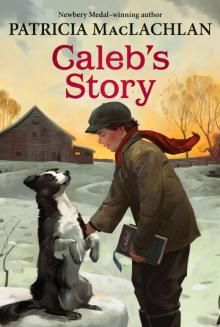 Caleb's Story
Caleb's Story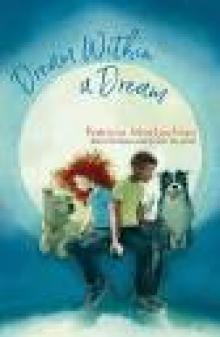 Dream Within a Dream
Dream Within a Dream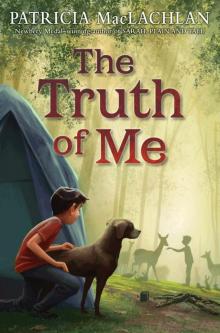 The Truth of Me
The Truth of Me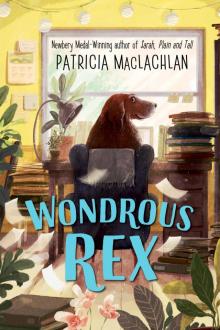 Wondrous Rex
Wondrous Rex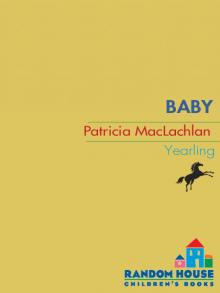 Baby
Baby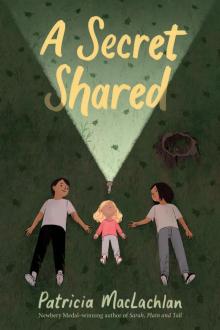 A Secret Shared
A Secret Shared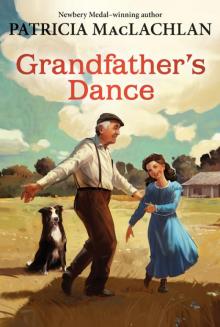 Grandfather's Dance
Grandfather's Dance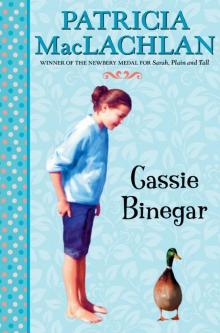 Cassie Binegar
Cassie Binegar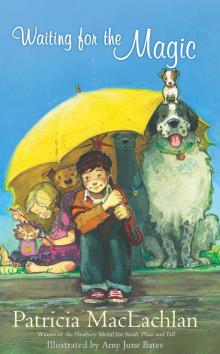 Waiting for the Magic
Waiting for the Magic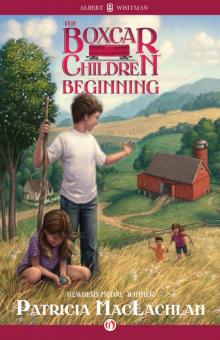 The Boxcar Children Beginning
The Boxcar Children Beginning My Father's Words
My Father's Words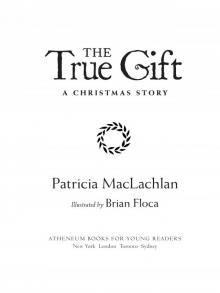 The True Gift
The True Gift